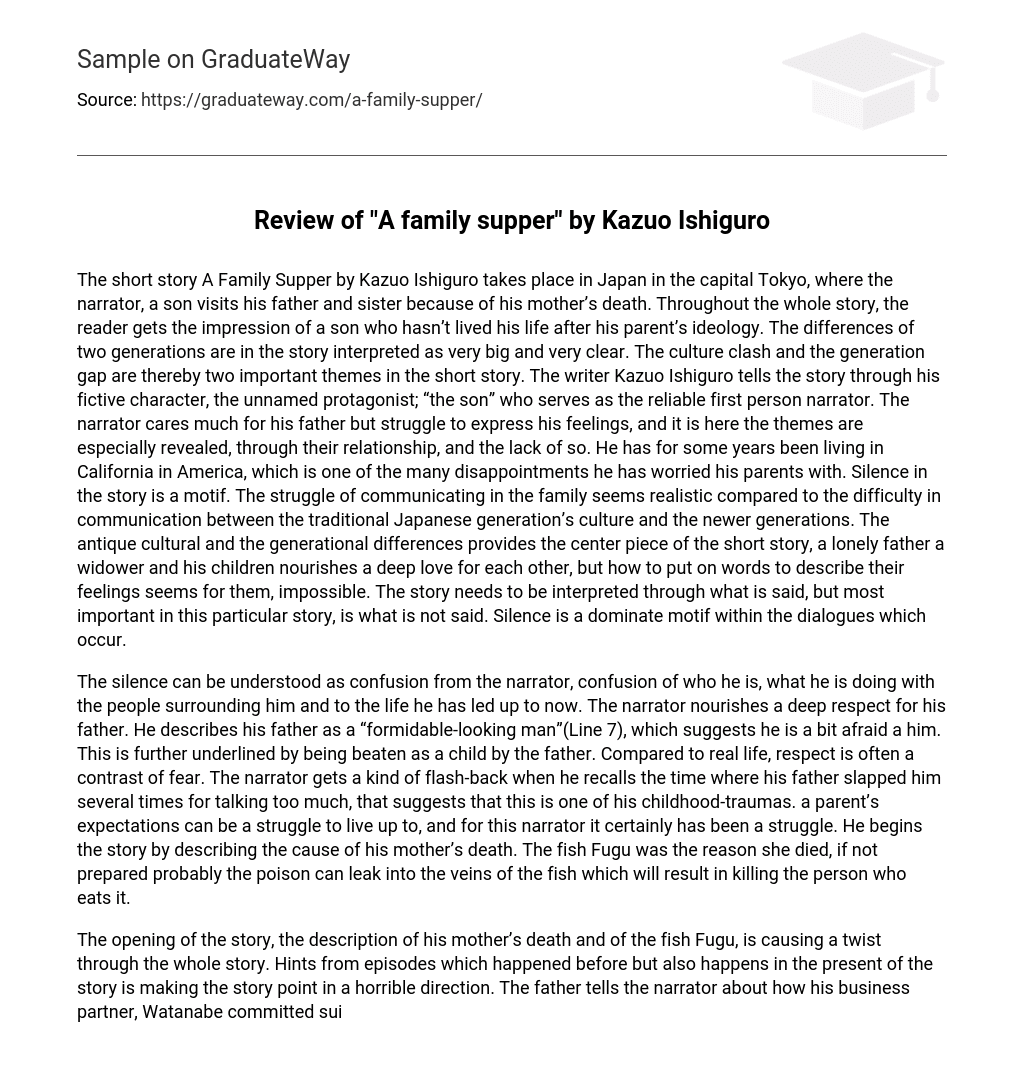The short story A Family Supper by Kazuo Ishiguro takes place in Japan in the capital Tokyo, where the narrator, a son visits his father and sister because of his mother’s death. Throughout the whole story, the reader gets the impression of a son who hasn’t lived his life after his parent’s ideology. The differences of two generations are in the story interpreted as very big and very clear. The culture clash and the generation gap are thereby two important themes in the short story. The writer Kazuo Ishiguro tells the story through his fictive character, the unnamed protagonist; “the son” who serves as the reliable first person narrator. The narrator cares much for his father but struggle to express his feelings, and it is here the themes are especially revealed, through their relationship, and the lack of so. He has for some years been living in California in America, which is one of the many disappointments he has worried his parents with. Silence in the story is a motif. The struggle of communicating in the family seems realistic compared to the difficulty in communication between the traditional Japanese generation’s culture and the newer generations. The antique cultural and the generational differences provides the center piece of the short story, a lonely father a widower and his children nourishes a deep love for each other, but how to put on words to describe their feelings seems for them, impossible. The story needs to be interpreted through what is said, but most important in this particular story, is what is not said. Silence is a dominate motif within the dialogues which occur.
The silence can be understood as confusion from the narrator, confusion of who he is, what he is doing with the people surrounding him and to the life he has led up to now. The narrator nourishes a deep respect for his father. He describes his father as a “formidable-looking man”(Line 7), which suggests he is a bit afraid a him. This is further underlined by being beaten as a child by the father. Compared to real life, respect is often a contrast of fear. The narrator gets a kind of flash-back when he recalls the time where his father slapped him several times for talking too much, that suggests that this is one of his childhood-traumas. a parent’s expectations can be a struggle to live up to, and for this narrator it certainly has been a struggle. He begins the story by describing the cause of his mother’s death. The fish Fugu was the reason she died, if not prepared probably the poison can leak into the veins of the fish which will result in killing the person who eats it.
The opening of the story, the description of his mother’s death and of the fish Fugu, is causing a twist through the whole story. Hints from episodes which happened before but also happens in the present of the story is making the story point in a horrible direction. The father tells the narrator about how his business partner, Watanabe committed suicide, thereafter the sister describes the suicide as a family murder: “He took his whole family with him. His wife and his two little girls.” (Line 61) The opening, the lie about the Watanabe family together with other hints is a foreshadowing of the supper that makes the reader believes that the father could inject his family with poison through the food. Another thing which could allude to an unhappy ending is that the father wants to forget everything which has happened in the past. It seems like he seeks a happy ending with no frustrations or what so ever. He also chooses to tell the narrator that his mother also was ready to let go of the misunderstandings from the past.
The ending of the short story seems confusing, because no answer is given, it is up to the reader to interpret what he thinks will happen at last. The short story takes place in the narrator’s father’s house in Tokyo, which is well-endowed, because of his father’s earlier success in his business career. the writer uses the narrative modes, direct speech, dialogue and report. He reports about the narrators mother at the opening, where he catches the reader’s interest as he describes the Fugu fish and the death of the mother. The opening is also one of the factors which makes the ending open. The themes are very clear through the story, cultural difference and generation gap.





